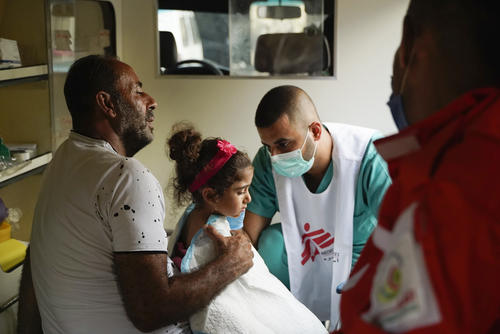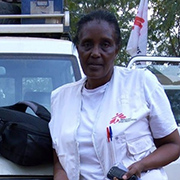South Sudan: The extremely premature baby who fought all expectations
The odds are stacked high against a tiny baby born at just 26 weeks in a remote maternity unit. From South Sudan, MSF midwife Priscilla shares this incredible story.
"I remember that day when the woman was admitted to our maternity ward in Lankien, South Sudan.
Her waters had broken and she was having contractions. Though six months pregnant, she had not received any antenatal care as she lived so far away from the hospital. She told us that unless a serious complication arose, the people in her village would not have brought her to the hospital.
Many women in her village delivered their babies at home, assisted by a skilled but unqualified traditional birth attendant. But, this time, she decided to come to the hospital because the birth was taking too long.
"She did not want to see her baby because she was certain that she was already dead"
She and her husband had struggled for five years to have a child, however, she had only had miscarriages, always around the same point in her pregnancy.
When she arrived at our hospital, her labour had already taken a long time. She was worried.
“Maybe I will never have a baby,” she said.
The chance of survival
She gave birth to an extremely premature baby girl. The baby weighed only 780 grams and was gasping for air irregularly after being trapped in the birth canal for several hours.
She had little chance of survival.
I picked her up, dried her thoroughly, clamped and cut the umbilical cord, wrapped her carefully and warmly, placed her on the resuscitation table and gave her oxygen.
Medical care where it's needed most
Help us care for people caught in the world's worst healthcare crises.

Afterward, once the baby was being monitored, I went back to check on the mother who had now started bleeding. We got this under control and moved her to the maternity ward for observation.
Sadly, she did not want to see her baby because she was certain that she was already dead and that her family had already taken the baby to be buried.
“She’s looking at me”
After ensuring the mother was safe, I asked one of the midwives to go back to where the baby was being cared for to check her condition. When the midwife saw her, she screamed, “Oh my god, look at this baby, she is looking at me with big eyes.”
I was shocked. “Is she alive?” I asked.
The midwife answered, “She is looking at me... so she is alive!”
Following our protocols for premature babies, I immediately started her on IV fluids and also on antibiotics because her mother had been in labour for more than 24 hours at home. I covered her in a thermal blanket and started an observation and treatment chart for her, too.
In numbers: Our work on maternal health
369,000
BIRTHS ASSISTED BY MSF TEAMS IN 2024, INCLUDING CAESAREAN SECTIONS
94%
OF ALL MATERNAL DEATHS OCCUR IN LOW AND LOWER MIDDLE-INCOME COUNTRIES
700
WOMEN DIED EVERY DAY FROM PREVENTABLE CAUSES RELATED TO PREGNANCY AND BIRTH IN 2023
Now came the time to let the mother know about her baby.
But, before I could hand the newborn over, I had a long talk with her. We talked about the baby’s condition and that she may not survive.
At this point, I was not sure what the best treatment for this baby would be – we did not have an incubator or a proper neonatal intensive care unit. So, she had to be on the ward with other mothers and babies around her. We made sure her bed was in a well-lit and well-ventilated spot.
Everybody, all the staff and all the family, had to work together for this baby.
Little by little
For several weeks the baby’s condition was up and down.
After the fourth week, she started gaining weight, little by little. She was crying and responding to things such as when she was hungry or wet. I thought to myself that we were getting somewhere.
"Nobody had ever seen such a fragile, premature baby survive in such a remote place"
But then, one day when checking on her, we found her unresponsive and gasping for air. When I touched her, she felt very cold and I thought she would die. I immediately took her to the resuscitation room and began treating her. She improved but she was now much weaker.
She continued to have these attacks, so we treated her with more IV fluids and antibiotics. Gradually, she improved.
When she was fully stabilised, I asked her mother to start holding her baby against her chest. We call this ‘kangaroo mother care’. She started breastfeeding well and we continued monitoring the baby's weight regularly.
After two and a half months in hospital, the baby weighed two kilos and was finally well enough to go home.
A wonder
Nobody had ever seen such a fragile, premature baby survive in such a remote place. The senior midwife at the facility said: “There have been wonders in medicine in the past and this could be one of them.”
The family and the community in Lankien village were very happy the day the baby was discharged. They all came to take her home, and the mother continues to bring the baby to the maternity ward for check-ups. She is doing very well.
Being with MSF has taught me that with teamwork, we can provide high-quality and comprehensive healthcare even with limited resources. We can save lives.
And, surely, this was a great miracle. A baby born at 26 weeks, weighing just 780 grams, somehow surviving.
She is alive, she is smiling and she is well."
MSF and maternal health
Many women across the world give birth without medical assistance.
This massively increases the risk of complications or death. Ninety-nine percent of these deaths are in low-income countries, however the majority are preventable with appropriate care.
Our healthcare teams work together with pregnant women to provide delivery services, emergency obstetric care and post-delivery consultations. We work with midwives and traditional birth attendants to establish programmes so that complicated births can be identified quickly to help prevent maternal deaths.

